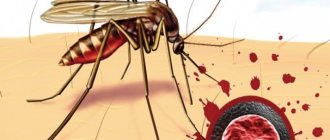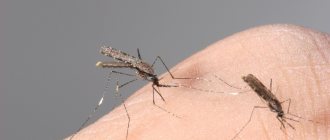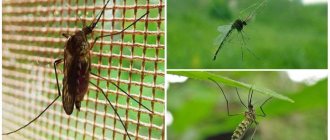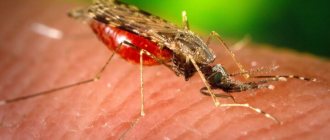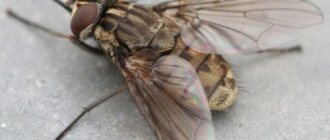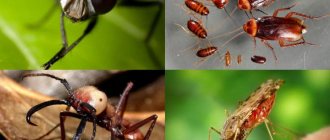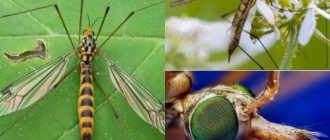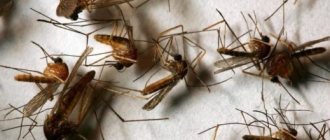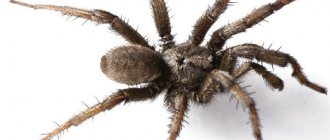Other causes of mosquito itching
But is this the only reason for mosquito itching? Why do mosquitoes squeak?
The fact is that in blood-sucking insects characteristic organs called halteres are responsible for balance. Their sound is associated with the activity of the organ of balance, and not at all with the wings.
By the way, halteres also used to have wings. This is evidenced by their shape, reminiscent of dumbbells or flasks. Their role can be compared with the role of a well-promoted spinning top. Its axis, maintaining a fixed orientation in space, allows you to maintain the balance of the entire structure.
Life activity in early spring
Mosquito
Where mosquitoes come from immediately after winter with severe frosts is a mystery to some people. There is nothing special about this for specialists. With the onset of cold weather, fertilized females look for a secluded place for wintering. They climb into the cracks of outbuildings, houses, forest litter, and tree bark.
Mosquitoes overwinter in a state of suspended animation, but do not fall into deep hibernation. As soon as you bring the insect into a warm room, it immediately comes to life. In winter, insects live in damp basements, where the temperature does not drop below +12 degrees Celsius. However, reproduction activity is not so high. Only females can overwinter.
Why does a mosquito make a high-pitched sound - entomologists explain
All flying insects stay in the air due to the constant back-and-forth motion of their wings, which creates lift. Butterflies have a wing area much larger than their body area; it is enough for them to flap them 5-10 times per second. This does not create much friction and the butterflies fly silently. The wings of flies, wasps and bumblebees are smaller than those of butterflies; they must be flapped 100-300 times per second. When it rubs against air, a characteristic bass rumble occurs.
The body of a mosquito, in addition to wings, is also equipped with their rudiments - halteres, which play the role of an organ of balance and allow it to hover over the skin of the victim before attacking. To keep the insect's body in the air, the thin wings and halteres need to beat 500 to 1000 times per second, resulting in the sound of the wings of a flying mosquito being barely tolerable to the human ear.
Fun fact: the sounds mosquitoes make are not a musical whim. They play a prominent role in the personal lives of insects. Females flap their wings more often than males, so the pitch of their flight is much higher. Actually, people only hear mosquitoes, since males do not show the slightest interest in bipeds. But mosquitoes can find “brides” by sound in complete darkness.
Another romantic nuance. The younger the female, the higher the sound she makes. If a boy mosquito hears the deep buzzing of a matron mosquito and the gentle sounds of the wings of a young beauty, he instinctively rushes to the second.
Reason for the squeak
An unpleasant sound for humans occurs as a result of the flapping of mosquito wings. The pest is capable of swinging from 500 to 1000 times per second, and the Forcips species is the leader among mosquitoes - up to 2000 swings per second.
Air compactions and expansions form near the wings. Hence the unpleasant squeak. The fly flaps its wings more slowly, and therefore it produces a buzzing sound. The bumblebee is buzzing because... the swings are even slower than those of a fly. If mosquitoes were larger and flapped their wings more slowly, they would produce a sound that was louder than a squeak.
In young and adult females, the squeak produced by flapping their wings is different. Males recognize adult females by characteristic sounds and mate with them. At this moment, mosquitoes gather in a swarm. A large number of squeaking pests in a room can reproduce.
The mosquito is unable to produce a squeak using other organs or parts of the body. For a person, the advantage of the squeak made by a pest is that you can prepare for an insect attack and kill it before it tastes blood.
So, a mosquito squeak is just a sound made by its wings.
Why the squeak?
Many insects buzz, but the mosquito squeaks. Why is that? The whole reason is the size of the insect itself. It is quite small in size, and its wings are too thin and narrow. Therefore, its flight generates a signal of the highest pitch, which is perceived as such a sound.
It squeaks and doesn't buzz.
For comparison, the frequency of oscillatory movements produced by the wings of a mosquito reaches 1000 hertz or more, and by the wings of a bumblebee - 130-240 Hz . Therefore, they do not produce a thin sound, like a mosquito, but a bass sound. The flight of butterflies is completely silent, because the frequency of movements of its wings varies from 5 -9 Hz. The exception is a butterfly called the hawk moth, which creates a squeak.
Why do mosquitoes buzz?
A mosquito is a two-winged insect from the long-whiskered group. The bloodsucker has a thin body, ranging from 4 to 14 mm in length. It has narrow, colorless wings, as well as elongated legs.
On the head there is a proboscis and two antennae. The color is brown, gray or black.
Insects live everywhere except Antarctica. Bloodsuckers live in forests in humid areas. They are distinguished by fast flight, the speed of which is 3.2 km per hour.
Most insects buzz. But not many people know why the mosquito squeaks. It produces sound due to its small body size and thin, narrow wings, which are the dorsolateral appendages of the middle thorax, which are developed in a single pair.
The appendages are oval in shape and have straight edges. Posteriorly there is an alula and an upper calypter covered with hairs.
During the flight of a small bloodsucker, a high-pitched signal resembling a squeak appears . The buzzing of a mosquito is accompanied by a subtle sound, since the oscillation frequency of its wings is from 1000 Hertz.
For example, a bumblebee creates a bassier sound when flying. This is not surprising, because the flapping frequency of its wings is 130-240 Hz.
It is interesting that butterflies fly silently. This is explained by the minimum number of movements of their wings, which is 5-9 Hz. But one species of lepidoptera is considered an exception - the hawk moth. This butterfly is also capable of squeaking.
Females can squeak more powerfully than males. Therefore, people hear mosquitoes that flap their wings more often than males. Moreover, the younger the female, the higher she will squeak.
Scientists also claim that bloodsuckers make a high-pitched sound, notifying their relatives of impending danger or the presence of a food source. That is why a large number of insects gather near a person in nature.
Life activity of mosquitoes
Life activity of a mosquito
The main task of males is to enable females to lay eggs. They live a short life - 10 days, feed on plant nectar, and spend most of their time in the meadow and forest. The main parasite is the female.
Virgin individuals also feed on nectar, but immediately after fertilization there is a need for blood. A mosquito can fly up to 300 km in search of a victim. Develops a speed of 3 km per hour. The insect will determine the location of the victim 30 m away.
Mosquitoes are attracted by the natural smell - carbon dioxide when exhaling, sweat, microorganisms on the skin. The heat emanating from the body also gives away the victim, since the mosquito has infrared vision. A female can bite up to 15 times in one night.
The average lifespan of a female is 3 weeks; theoretically, she can live about 119 days. There are many enemies in nature - dragonflies, frogs, newts, lizards, chameleons, beetles. And also a person with chemical weapons, various means to combat mosquitoes.
Mechanism of sound appearance
The squeak of a mosquito is familiar to everyone - extremely thin, annoying, irritating. Warns that at the slightest opportunity a bite will follow. It would be much more profitable for a blood-sucking creature to approach the victim silently, but the parasite cannot prevent the appearance of a special signal.
It does not produce sound from the mouth or nasopharynx. What a mosquito squeaks is of interest to many. The sound comes from its wings, which it flaps with extraordinary speed. When it comes into contact with air, a sound similar to squeaking appears. A peculiar buzzing sound begins to be emitted immediately with the first flap of its wings.
Interesting!
Why mosquitoes do not buzz, like many other insects, also has its own explanation. The wings are extremely thin and narrow, and the mosquito itself is miniature in size. In blood-sucking creatures, special halteres, not wings, are responsible for balance in the air. Therefore, the sound is produced more by these parts of the body than by flapping the wings at high speed.
Ubiquitous mosquitoes
Let's talk about mosquitoes now. There are 120 species of blood-sucking mosquitoes on Earth. Mosquitoes “take wing” and begin an active flight life when the air temperature steadily exceeds +14 °C. Check it out! Mosquitoes, like snakes, cats and some other animals, have special “thermal locators”. With their help, mosquitoes find their victims. Only females suck blood. But each one can make up to 8 passes per night! Therefore, there may be only 2 - 3 mosquitoes in the room at night, but it seems to us that there is a whole flock of them. But you can still fight them. Mosquitoes are afraid of the smell of cloves, valerian, anise or wild Caucasian chamomile. And here's what's interesting. The mosquito, despite its many legs, cannot walk! Therefore, when there are a lot of mosquitoes on the street, it is not at all necessary to cover the windows and vents with fine gauze. You can limit yourself to a large mesh - and there will be enough air in the room, and no mosquito will fly by! People often wonder why mosquitoes sit upside down on the ceiling? It turns out that everything is very simple. Warm air, as we know, rises and accumulates near the ceiling. And mosquitoes love warmth!
Different mosquito squeaks
Initially, it seems that all mosquitoes squeak the same way, but if you listen, the sounds are different. Males create a hum and are not particularly annoying to the human ear. Since they are not interested in blood, they are seen much less often than females.
Females communicate using squeaks. They transmit messages to each other about the location of a potential victim and warn of danger. Females attract males for mating with a thin squeak and flap their wings more often than usual. After fertilization, the individual sits quietly on the sidelines for several days, digesting food. And also during this time eggs are formed. Laying is done in a couple of days in a standing pond.
On a note!
Mosquitoes are attracted to a person by the smell of lactic acid, carbon dioxide, and infrared color, which forms an aura around the body. As soon as one female detects a victim, after a few minutes the person has to fight off a colony of annoying pests.
Various mosquito squeaks
Many people have noticed that the pest squeaks differently. It is either a thin, piercing sound, or an annoying hum. The hum is characteristic of males. Females squeak, and with different ranges. This is explained by physiological characteristics, as well as by the insect’s excessive efforts to find a pair for fertilization. The female flaps her wings much more intensely to attract the attention of the opposite sex.
After fertilization, the mosquito is busy looking for places to lay eggs, so its movements in the air are more balanced, slower, and the flight sound range changes. By this, the female makes it clear to the males that they cannot touch her yet.
Mosquitoes
Interesting!
The younger generation becomes sexually active from the moment they are born. The males are the first to emerge from the pupa, fly to the grass near the reservoir where the larvae previously lived, and wait for the release of a batch of young females.
Experts also claim that with the help of squeaks, blood-sucking creatures give each other a signal about the presence of food or danger. For this reason, a large colony of bloodsuckers always accumulates around a person in nature, which is very difficult to fight off.
Reasons for the effectiveness of ultrasonic repellers
Insects emit a characteristic squeak to convey to others a signal of danger. Fertilized females use sound to repel males. Ultrasonic repellers imitate danger signals - the flight of a dragonfly, the signals of a bat, and also the warning of a fertilized female. Simple devices are extremely effective in the fight against bloodsuckers, which once again confirms their important role in creating the squeak of mosquitoes.
In parallel with this, the characteristic sounds of mosquitoes indicate the approach of insects to the victim - a person, and risk being killed. The same feature notifies natural enemies about the location of food.
Sources
- https://klop03.com/komary/pochemu-komar-pishhit.html
- https://MosquitoMagnet.ru/articles/fakty-iz-zhizni-komarov/pochemu-komar-izdayet-tonkiy-zvuk.html
- https://ParazitDoma.ru/drugie-parazity/pochemu-komar-pischit
- https://notklop.ru/komary/o-komarah/pochemu-komary-pishchat/
- https://apest.ru/komary/o-komarah/pochemu-komary-pishchat/
